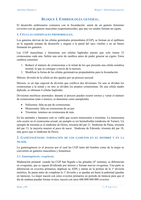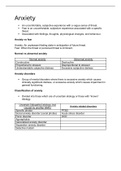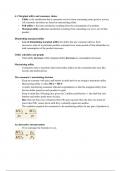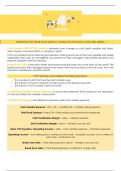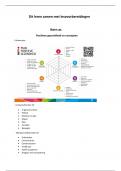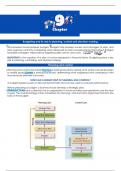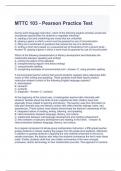Michelle van Diën – 413154md
Problem 5 - Plan the work and work the plan
Dent, Amy L., Koenka, Alison C.,. (2015). The Relation Between Self-Regulated Learning and Academic
Achievement Across Childhood and Adolescence: A Meta-Analysis. Educational Psychology Review,
28(3), 425–474. doi:10.1007/s10648-015-9320-8
Two meta-analyses to explore the relation between academic performance and two components of self-
regulated learning: (1) its defining metacognitive processes and (2) students’ use of cognitive strategies.
Theoretical Framework
Defining Self-Regulated Learning
Zimmerman (1986): Learning is self-regulated to the extent that students are cognitively, motivationally,
and behaviorally active participants in an academic task.
A working definition that incorporates many perspectives (Pintrich, 2000): self-regulated
learning is an active, constructive process whereby students set goals for their learning and then
attempt to monitor, regulate, and control their cognition, motivation, and behavior, guided and
constrained by their goals and the contextual features of their environment. Highlighted the
assumptions underlying most models of self-regulated learning:
Modeling Self-Regulated Learning
● Common Features:
1. Self-regulated learning is an active, constructive process.; Self-regulated learners approach academic
tasks proactively, creating their own goals and strategies that draw upon prior knowledge and cues in
the learning environment.
2. Self-regulated learners set task-specific learning or achievement goals.
3. The presence of a self-oriented feedback loop (students’ attempt to monitor, regulate, and control
their cognition, motivation, and behavior). Goals serve as the standard against which students evaluate
their performance of a task. When performance does not meet this standard, self-regulated learners
adapt their approach to the academic task. Could involve changing their initial strategies or the task goal
itself.
4. An acknowledgement that students’ cognition, behavior, and motivation all play a role. Students self-
regulate their cognition when they select and enact cognitive strategies: the cognitive processes
students employ during an academic task. Strategies are implied or explicitly induced as key cognitive
processes that self-regulation acts upon in order to accomplish a task goal. The monitoring and control
that characterize students’ self-oriented feedback loop are thus higher-order/metacognitive skills. These
skills also enable the self-regulation of academic behavior. Motivation plays an important role in
initiating and sustaining self-regulated learning. Metacognitive processes explain how students self-
regulate their learning, motivation tells us why they do so.
Consensus around five metacognitive processes: goal setting, planning, self-monitoring, self-
control, and self-evaluation. These metacognitive processes are responsible for regulation of the
learning process per se and serve to unify theoretical models.
Goal-setting: self-regulated learning is directed by the goals that students set for an academic
task. Part of planning: activating metacognitive knowledge in order to develop a course of action for the
academic task.
When students move from preparing for an academic task to performing it. Self-monitoring: an
awareness of progress or performance on an academic task. Awareness of discrepancy between their
Problem 5 - Plan the work and work the plan
Dent, Amy L., Koenka, Alison C.,. (2015). The Relation Between Self-Regulated Learning and Academic
Achievement Across Childhood and Adolescence: A Meta-Analysis. Educational Psychology Review,
28(3), 425–474. doi:10.1007/s10648-015-9320-8
Two meta-analyses to explore the relation between academic performance and two components of self-
regulated learning: (1) its defining metacognitive processes and (2) students’ use of cognitive strategies.
Theoretical Framework
Defining Self-Regulated Learning
Zimmerman (1986): Learning is self-regulated to the extent that students are cognitively, motivationally,
and behaviorally active participants in an academic task.
A working definition that incorporates many perspectives (Pintrich, 2000): self-regulated
learning is an active, constructive process whereby students set goals for their learning and then
attempt to monitor, regulate, and control their cognition, motivation, and behavior, guided and
constrained by their goals and the contextual features of their environment. Highlighted the
assumptions underlying most models of self-regulated learning:
Modeling Self-Regulated Learning
● Common Features:
1. Self-regulated learning is an active, constructive process.; Self-regulated learners approach academic
tasks proactively, creating their own goals and strategies that draw upon prior knowledge and cues in
the learning environment.
2. Self-regulated learners set task-specific learning or achievement goals.
3. The presence of a self-oriented feedback loop (students’ attempt to monitor, regulate, and control
their cognition, motivation, and behavior). Goals serve as the standard against which students evaluate
their performance of a task. When performance does not meet this standard, self-regulated learners
adapt their approach to the academic task. Could involve changing their initial strategies or the task goal
itself.
4. An acknowledgement that students’ cognition, behavior, and motivation all play a role. Students self-
regulate their cognition when they select and enact cognitive strategies: the cognitive processes
students employ during an academic task. Strategies are implied or explicitly induced as key cognitive
processes that self-regulation acts upon in order to accomplish a task goal. The monitoring and control
that characterize students’ self-oriented feedback loop are thus higher-order/metacognitive skills. These
skills also enable the self-regulation of academic behavior. Motivation plays an important role in
initiating and sustaining self-regulated learning. Metacognitive processes explain how students self-
regulate their learning, motivation tells us why they do so.
Consensus around five metacognitive processes: goal setting, planning, self-monitoring, self-
control, and self-evaluation. These metacognitive processes are responsible for regulation of the
learning process per se and serve to unify theoretical models.
Goal-setting: self-regulated learning is directed by the goals that students set for an academic
task. Part of planning: activating metacognitive knowledge in order to develop a course of action for the
academic task.
When students move from preparing for an academic task to performing it. Self-monitoring: an
awareness of progress or performance on an academic task. Awareness of discrepancy between their


